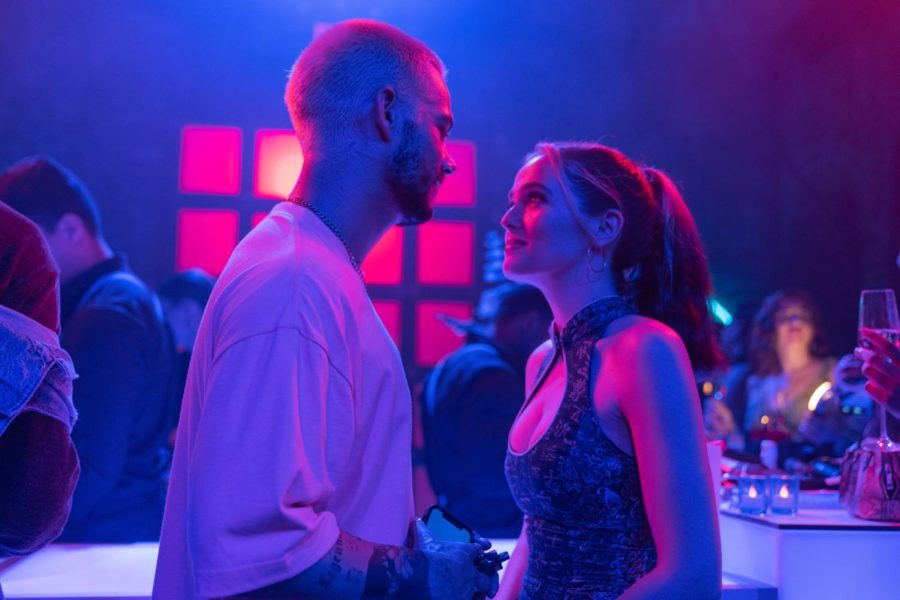‘Not Okay’ calls out performative activism
September 4, 2022
“Not Okay” is a satirical dark comedy movie written and directed by Quinn Shepard. The main cast includes Zoey Deutch, Dylan O’Brien and Mia Isaac. It premiered on Hulu on July 29.
Deutch plays Danni Sanders, a photo editor and wannabe writer for an online magazine in New York City. O’Brien plays Danni’s love interest, Colin, a co-worker and social media influencer known for his love of marijuana.
Danni attempts to win Colin’s attention by lying about attending a writer’s retreat to Paris. Realizing she could not afford to follow through with going to Paris, she takes photos of herself in New York and photoshops the background to show Paris. Days into Danni’s pretend trip, a terrorist attack unfolds in the actual Paris.
Danni goes along with reality and acts as a survivor. She joins a support group to understand trauma victims’perspectives so she can write an article of her unlived experience. There she meets Isaac’s character, Rowan Aldren, a school shooting survivor and anti-gun activist.
Impressed by Rowan’s social media platform, Danni writes a hit article and garners thousands of supporters for herself. She later joins Rowan in holding a rally, but Rowan collapses from post-traumatic stress. Danni then sees the web of lies she has trapped herself in and must come clean and face the consequences.
Viewers were warned that the main character would not be a favorable one and Deutch played the role of antihero well. Her lack of self-awareness balanced with a tinge of relatability is enough for the audience to sympathize with her, but still eye roll at her tone-deafness.
O’Brien did not have much screen time and his character was meant to lack depth. The nonchalant and easygoing personality of Colin was well executed by O’Brien, thanks to the help of his vape pen and phone addiction.
Isaac has not had as many roles as Deutch and O’Brien, but her performance as Rowan is phenomenal. Her facial expressions and body language of mild discomfort and eventual rage could be sensed and shared by the audience.
The movie also does a good job of representing the characters through fashion. Danni’s style consists of thick rings and bright clothing typically from fast fashion companies, signifying her desire to fit in with current trends. Rowan’s style of baggy clothing and earth-tone colors represent her authenticity. Danni co-opts Rowan’s style when she deletes her social media.
Although Danni did not receive a redemption, there is satisfaction found in this unexpected ending.
“Even at the end of that scene, Danni walks out, which is a metaphor for her leaving the narrative and leaving the story, because she’s realised that this isn’t about her, for the first time” Isaac said during an interview with Refinery29.
However, some viewers are discontent with the ending, but not because they believe in redemption for Danni. “The problem with ‘Not Okay’ is that, as Danni runs, the camera — the eye of the film — follows her, suggesting that we should leave the antihero with sympathy, or at least that she should remain the focus of our attention” Los Angeles Times writer Steven Vargas said in his review of the show.
“Rather than confront our attraction to performative activists, who need an audience to perform to, it perpetuates it; rather than shift the frame to Rowan and the marginalized groups on the front line, it tells yet another story of privilege run amok.
Vargas’ perspective is valid. The rushed ending of “Not Okay” is not enough to condemn the harm Danni has done.
This movie serves as a commentary on how the privileged can steal and profit from real victims, all while pretending to be an advocate. The plot is similar to the real life story of Tania Head, a woman who claimed to be a survivor of the 9/11 attacks. There are also parallels to the story of Rachel Dolezal, a white instructor and activist who presented herself as a Black woman.
Performative activism is everywhere and exists beyond individuals. It is embedded into politics, corporate feminism and predominantly white institutions. “Not Okay” warns us to be aware of people and institutions who claim to be allies but have ulterior motives.








